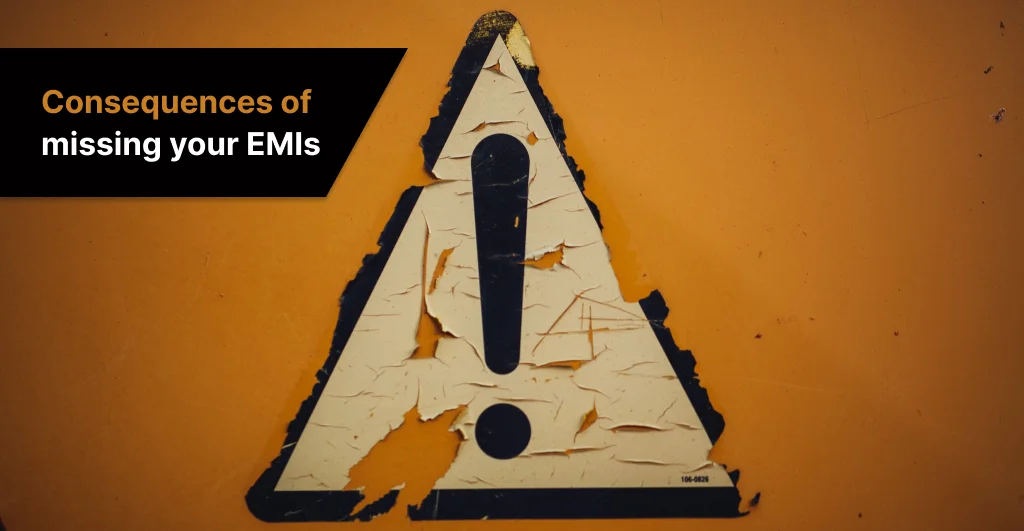Missed Your EMI Payment? Know Its Consequences

Digital loans have made credit accessible to millions of Indians. But as convenient as it is to get access to money, it is equally important to keep a clean repayment history.
Sometimes, due to either unfortunate circumstances or poor financial planning people tend to miss their EMIs and that can lead to negative consequences on your credit profile.
Table of Contents
ToggleWhat Does It Mean to Default on Your Loan?
When you take a personal loan from a lender, you have to pay it back with interest according to your repayment plan. When you miss your EMI payment, it is known as defaulting on your loan.
The consequences of defaulting your loan can range from a dent in your credit score to legal repercussions.
Classification of Loan Defaults
Missing out on your EMIs is known as defaulting on your loan repayments. There are two types of defaults based on the number of days past your repayment due date that you haven’t paid the EMIs.
1. Minor Default: This happens if you don’t pay your EMI for up to 90 days. The consequences of making a minor default may be severe but you can make up for it over a period of time by repaying the overdue amount.
2. Major Default: This happens if you don’t pay your EMI for more than 90 days. When your EMIs are in major default then your loans would be classified under “Non-Performing Assets”.
Types of Loan Defaults
A loan default need not always be a missed EMI. There are many other types of loan defaults you should be aware of:
Technical Default
When you violate the terms and conditions of your loan agreement, it is considered as a technical default. Some examples of a technical default are not maintaining a particular debt-to-income ratio, not providing timely financial statements, etc. depending on the agreement.
Covenant Default
When taking a personal loan from any NBFC or Bank, you need to adhere to certain agreements known as covenants. This kind of default can occur when you don’t meet certain requirements like maintaining a particular level of collateral, not meeting the required financial ratios, etc.
Cross Default
Cross default is when you default on one loan which triggers a default on any other loan with the same or different lender.
Strategic Default
A strategic default is when you intentionally miss your loan repayment.
Also Read: Why Opting For an NBFC Personal Loan is a Better Option?
Consequences of Missing EMI Payments
Understanding the consequences of missing your EMIs can help you put into perspective the importance of making your repayments on time and keeping your finances on track.
Here are 6 things that can happen to you if you miss making your repayments on time:
1. Late Fees and Penalty Charges
If you keep delaying your EMI payments, you will end up attracting late fees and penalty charges. The penalties vary from lender to lender and also depend on the number of days you miss your EMIs. Many lenders offer a grace period where there are no penalties in the first few days. But you need to check your loan agreement to understand the repayment policies.
2. Negative Impact on Credit Score
Your credit score is a three-digit number that speaks volumes about your repayment habits. Whenever you miss your EMI, your credit score gets reduced. This can negatively reflect on your credit profile for a long period of time.
3. Reduced Chances of Getting a Loan in the Future
You get a credit offer after the lender carefully assesses your credit profile. While different lenders have different eligibility criterion, a bad credit profile and low credit score definitely reduces your chance of getting a loan with these lenders.
4. Account Reported to the Bureau
If you haven’t repaid your EMIs for more than a month, then your lender can report your account to the bureau.
When your loan account is reported to the credit bureau for non-repayment of your EMIs, it can further damage your credit profile which would limit your access to credit in the future.
5. Account Reported as Delinquent or Defaulter
If your account is reported as delinquent or a defaulter, it means you have failed to repay the overdue payments and have breached the loan agreement. Although being reported as a defaulter has a more severe consequence than being reported as delinquent, both significantly damage your credit profile.
6. More Persuasive Collection Attempts
Being constantly nudged by the recovery agents can be very annoying. But if you ignore them and continue not repaying the loan, the frequency of attempts to collect the outstanding money might go up.
What to Do next? If You Missed Your EMI Payment
1. Inform Your Lender Immediately
If you haven’t repaid your EMIs due to a cash crunch and the lenders are making collection attempts, inform them about your situation. You can request your lender to allow you to make part-payments or even negotiate your repayment options.
2. Prioritize Your Repayments
Before you prioritize your repayments, take your income, expenses, and savings into consideration.
Next, make a list of all your overdue payments along with factors like interest rates, size of the debt, minimum payment required, etc. Then decide which EMIs you want to close first.
Read more about ways to repay your overdue EMIs here.
3. Repay Your Loans in Part-Payments
You can request your lender to allow you to repay your loan in part-payments. This will reduce the pressure of having to repay your loan at once.
4. Use Your Emergency Fund or Savings to Clear Your Repayment.
If you have an emergency fund or savings handy, then use it to close all your EMIs. This will stop further damage to your credit score.
5. Take a Debt Consolidation Loan
If you don’t have an emergency fund or enough savings, you can consider taking an emergency loan. You can combine all your ongoing debts and overdue EMIs into a single loan and use an emergency loan to repay it.
How to Avoid Missing Your EMIs in the Future
1. Create a Better Financial Plan
Creating a financial plan for all your expenses in advance can help you save money for your repayments and avoid missed EMIs on your loan.
2. Build an Emergency Fund
While creating a financial plan can help you save money for your EMIs, it is always better to be prepared for unfortunate situations. An emergency fund can help you do that. It is money from your income you should put aside to cover at least 3-6 months of your living expenses. So even if you face any financial crisis, it won’t hamper your EMI repayments.
3. Set Your Repayments on Auto-Debit.
If you keep forgetting your EMI dates, you can simply set your EMIs on auto-debit. This way you can conveniently organize your finances better and avoid any kind of late payment charges.
4. Communicate with Your Lender
If you’re going through any kind of financial crisis, then being proactive and informing your lender about it can show you’re a responsible borrower. Your lender might be able to assist you and provide a solution.
Also Read: Taking a Personal Loan Upto 1 Lakh
Conclusion
While it can be a little tempting to take loans given how easily they are available, it is more important to evaluate your financial situation and plan your personal loan repayments.
You can use an EMI calculator to plan your EMIs even before taking a loan.
Doing this simple thing can help you avoid any kind of missed EMIs and maintain good credit profile.
Frequently Asked Question
What Happens If You Miss An EMI?
These are some consequences you can face if you miss an EMI:
- Late Fees and Penalty charges
- Negative impact on credit score
- Reduced chances of getting a loan in the future
What Is The Penalty For Delayed EMI?
The extra fees and penalty you’re charged on a delayed EMI depends on the lenders and their terms. For example, if you default on a Zype loan, you will be charged a late payment penalty charges & overdue interest which will be charged to your total outstanding amount on daily basis.
What Happens If You Miss 2 Payments?
If you miss 2 payments, you might have to pay a penalty on your outstanding loan. You may also receive collection calls and messages from agents.
Does A 7 Day Late Payment Affect Credit Score?
Yes, a 7 day late payment can negatively affect your credit score. However, it isn’t reported in your credit profile for 30 days.
Does 1 Day Late Payment Affect Cibil Score?
Yes, a 1 day late payment can negatively affect your credit score. However, it isn’t reported in your credit profile for 30 days.
How Do I Ask For Late Payment Forgiveness?
Asking for late payment forgiveness can reduce the consequences of missed EMI payments. You can send a formal letter to your lender to do the same.
How Can I Improve My Credit Score After 1 Late Payment?
The first thing you’re supposed to do to protect your credit score from damage is to pay off your EMI amount immediately.
Can Missing Loan Emis Lead To Legal Action Against Me?
Yes, if you default on your EMIs for too long it can lead to a legal action.
What Should I Do If I Anticipate Difficulty In Making My Emi Payments?
Contact your lender to negotiate your terms of borrowing which fit your budget or consider debt consolidation to clear your outstanding.
YOU MAY ALSO LIKE


Search by posts
Recent post
Categories
- Blog (6)
- Credit History (37)
- Credit Line (7)
- Festive (4)
- Finance (15)
- Mutual Fund (19)
- Personal Loan (297)
- Tax (8)
- Zype (4)












